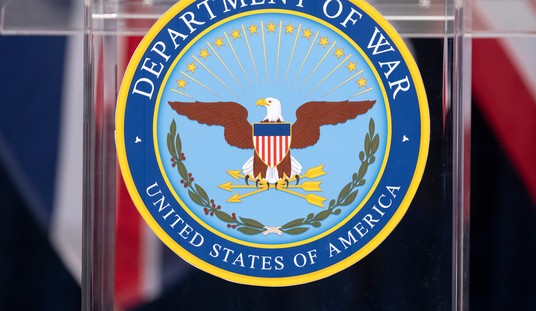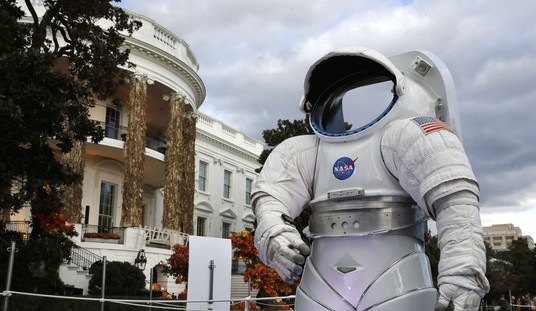This just in: Big cities tend to be near large bodies of water. 'Twas always thus. Back in the day, rivers and seas were necessary for travel and shipping. Plenty of modern-day cities are still located on ports (San Francisco, New York), large rivers (St. Louis, Memphis), or both (New Orleans, Boston).
Among the oft-ballyhooed effects of climate change are, of course, a rise in sea levels and flooding, which would disproportionately affect areas that are, you know, near water.
It's also well-known that most LGBT people prefer the urban or, at least, suburban lifestyles. You won't find too many vocal, LGBT types living out in the sticks. I won't speculate as to the reasons for that, but that seems to be how things are.
So it's really no surprise that a progressive UCLA School of Law study (wait, what? School of law? Not geology, not even Gender Studies, but law?) claims that LGBT couples are at higher risk from the effects of climate change than the general populace. Because of course, they are.
"Same-sex couples are more likely to reside in communities with poorer infrastructure and less access to resources. They are, therefore, less prepared to respond and adapt to natural hazards and other climate disruptions," the report, authored by data analyst Lindsay Mahowald and senior fellow Ari Shaw, said.
As such, lawmakers and disaster relief service providers should "ensure that disaster relief is accessible and administered without discrimination on the basis of sexual orientation, gender identity, or gender expression," including access to HIV medications and financial support for LGBTQ+ individuals and families should they be displaced from their homes, researchers suggested.
Ah, there you go - the call for more government spending. It's as sure as spring rain. Also: "Without discrimination"? If they are making an effort to administer said relief, purposely and deliberately, to the LGBT population, isn't that... well, discrimination?
See Related: Oklahoma Official Takes Action Against Biden Administration's Effort to Redefine Title IX
UCLA Med School's 'Health Equity' Class Teaches 'Weight Loss a Hopeless Endeavor,' Slams 'Fatphobia'
It's interesting that this study, such as it is, specifies LGBT couples, not just LGBT people in general; while the raw data for this work hasn't been available (of course), this smells a lot like cherry-picking the data to reach a predetermined conclusion.
Or is it? As recently as 2019, same-sex couples actually had higher incomes than traditional couples.
How do household income and poverty status differ among these married couples?
- Overall, same-sex married couples had a higher median household income than opposite-sex married couples: $107,200 and $96,930, respectively.
- Same-sex female married couples had a lower median household income than same-sex male married couples: $95,720 and $123,600, respectively.
- Same-sex male married couples had a higher income than opposite-sex married couples but the difference in median household income between opposite-sex and female same-sex married couples was not statistically significant.
Well, dudes married to dudes, I guess this UCLA study, and any eventual, recommended government intervention,s don't apply to you - good luck out there!
Here's where the UCLA study (linked at the start) strays into "belaboring the obvious":
Homosexual couples are disproportionately located in coastal areas and cities, making them more vulnerable to certain hazards, researchers claimed. Among the 15 counties with the highest proportions of same-sex couples, all are in coastal or urban areas, the study said.
"This indicates that LGBT people in same-sex couples are more likely to be located in places with large impervious surface areas, high housing density, and low-lying infrastructure," the report said.
So, cities. Coastal areas. Like San Francisco. Boston. Most of our major urban areas.
Of course, the notoriously left-wing Center for American Progress is in on this.
In 2022, the Center for American Progress wrote a report titled, "How Environmental and Climate Injustice Affects the LGBTQI+ Community."
What's sad is the number of people, especially people in the permanently aggrieved communities, who will just buy all of this bunkum without a moment's thought. We didn’t have as much of this nitwittery when the schools still taught things like history, economics, civics, and actual critical thinking; nowadays, of course, “critical thinking” is interpreted by the left as “you’ll think what we tell you and damn well like it.”
In any climate crisis - even small-scale events (weather) like major storms, floods, hurricanes, whatever - any emergency response cannot and must not be focused on any "community." Emergency responses must be the same for everyone, regardless of... well, anything. There's no other way for a civilized society that spends taxpayer dollars on things like emergency services to operate.
Other than that, it's not clear what the ask here is. Are we supposed to subsidize LGBT people who want to move into the hills to avoid rising seas? Are we supposed to subsidize them by putting their houses on stilts to avoid floods? Even if we accept this UCLA study at face value, what are they proposing we do about it? Oh, there is the usual talk about federal climate initiatives, but that's not any kind of focused action.
As of this writing, the Biden administration hasn't replied to a request from Fox News as to whether they will provide more federal funding for the intersection of LGBTQ+ and climate change research; I guess that there will be no reply because there isn't any meaningful action to be taken.
And, as I’ve always said and will continue to say, I’ll believe there is a climate crisis when the people who keep telling me there’s a climate crisis start behaving like there’s a climate crisis.















